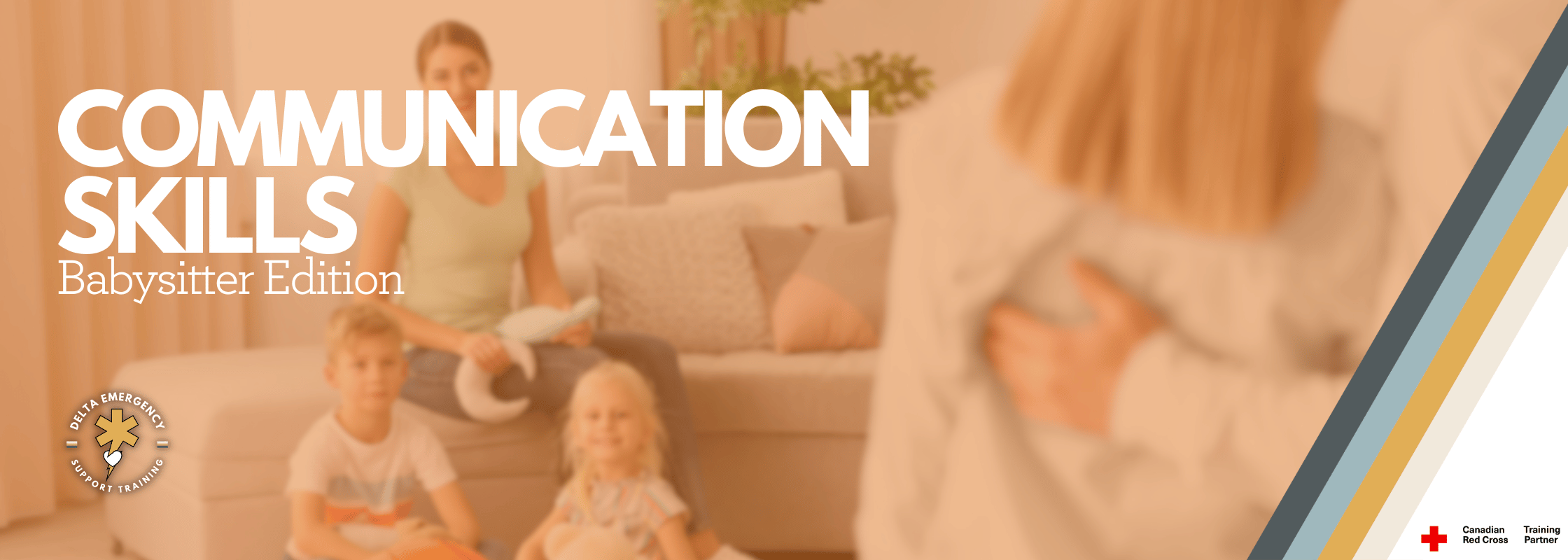Communication Skills for Babysitters: Building Trust and Ensuring Success
/Babysitter and children having a conversation with parents
As a babysitter, one of the most important aspects of your job is establishing clear, open, and respectful communication with parents. Good communication not only helps create a positive environment for the child but also ensures that the parents feel confident and comfortable with you looking after their little one. Whether you're a seasoned sitter or just starting out, developing strong communication skills with parents is key to building trust and ensuring a smooth babysitting experience.
Here are some essential communication skills every babysitter should practice:
1. Be Clear and Transparent from the Start
Before you even begin babysitting, it’s crucial to establish clear expectations with the parents. This includes discussing:
Schedule Details: When will you arrive? When will you leave? What time will the child go to bed?
Household Rules: Are there any specific rules regarding screen time, snacks, or behavior expectations?
Emergency Protocols: Where are the first aid kits? How can you contact the parents in case of an emergency?
Location Guidelines: Are there any areas or rooms in the house that are off-limits to the child? Can you take them to the park or on a walk outside?
By laying all this out in advance, you reduce the chances of any misunderstandings down the line. The more information you have, the better prepared you’ll be.
2. Discuss Daily Routines & Schedules
It’s important to ask parents about their child’s daily routines, as these can help you provide a sense of normalcy and comfort for the child. Some key things to discuss include:
Sleep Schedules: When does the child normally nap or go to bed? What bedtime routine works best for them (reading a book, playing soft music, etc.)?
Meal Times and Snacks: What is the child’s typical eating schedule? Are there any specific foods or snacks they enjoy (or dislike)? Be sure to ask about any allergies or food restrictions.
Favorite Activities: Does the child have any favorite toys, games, or hobbies you should engage in? This helps you bond with them and make the experience more enjoyable.
Having a clear understanding of these routines ensures that the child feels secure and is kept on their regular schedule, even when their parents are away.
3. Ask About Screen Time & Digital Entertainment
In today’s digital age, it’s essential to discuss the parents’ preferences for screen time. Some parents may be strict about limiting TV or tablet time, while others may allow more flexibility. Be sure to ask:
How much screen time is allowed: Is there a limit on TV shows, movies, or gaming time?
Preferred shows or apps: If screen time is allowed, are there specific shows, movies, or educational apps they prefer?
Alternatives to screen time: If parents don’t want the child to be on screens too much, what activities do they suggest instead (crafts, puzzles, outdoor play, etc.)?
Being clear on screen time rules helps prevent any misunderstandings and ensures you're following the parents’ guidelines for technology use.
4. Discuss Discipline & Behavior Expectations
Every family has different approaches to discipline, and it’s essential to know the boundaries and strategies they prefer you to use. Some parents may use positive reinforcement (praise and rewards), while others might have specific time-out routines or other methods. Be sure to ask:
Discipline methods: What do parents consider acceptable or unacceptable behavior? How should you address any misbehavior?
What to do in case of a tantrum: Does the child have specific triggers or ways they prefer to calm down? Should you let them cry it out, or do they need more comfort?
Words and phrases to avoid: Some parents may have specific words they prefer you avoid (like “no” or “don’t”), and they may use positive language instead.
Knowing how to handle discipline ensures consistency in how the child is treated, making the transition from parent to babysitter seamless.
5. Know What’s Safe and Where You Can Go
It’s important to get permission for any activities you plan on doing outside the home. Some parents may have strict rules about where their child can go or who they can be around. Discuss:
Where you can take the child: Are you allowed to take them to the park, the store, or on a walk?
Visitors or friends: Is it okay to have a friend or neighbor come over while you're babysitting?
Outdoor activities: Can you play in the yard, or are there any restrictions regarding outdoor play (e.g., no playgrounds, only in the front yard)?
Having clear guidance on this will prevent any potential issues and ensure that both you and the parents are on the same page regarding boundaries.
6. Provide Regular Updates
Parents will appreciate knowing how things are going while they’re away. Depending on the length of the sitting, consider sending short updates on how their child is doing. For example:
"Everything is going great! We just finished dinner, and now we’re reading a book before bed."
"We’re having a blast! Just wanted to let you know that your little one is settling in well for a nap."
These updates not only reassure parents but also demonstrate that you're attentive and engaged with their child’s needs.
7. Use Positive Language
Even if you encounter challenges or difficult moments during your time babysitting, try to frame them positively. For example, instead of saying, “The child refused to take a nap,” you could say, “It took a little extra time for the child to wind down, but we’re working on a quiet activity in the meantime.”
Positive communication reinforces the idea that you're focused on problem-solving and providing the best care, rather than dwelling on any negative situations.
8. End the Babysitting Session with a Summary
When the parents return, take a few minutes to provide a quick summary of how the day went. Let them know about:
What activities you did
Any challenges faced and how they were handled
Whether the child ate well, took a nap, or had any particular emotional moments
This summary not only helps the parents feel more connected to their child’s day but also opens the door for constructive feedback. It shows that you are committed to improving and learning from every experience.
9. Be Open to Feedback
Finally, one of the most important skills you can develop is the ability to receive feedback. After each sitting, ask the parents how things went and if there’s anything you could do differently. Take note of their preferences and continuously improve your approach.
For example, if a parent says they prefer you to limit screen time more strictly or follow a different bedtime routine, make sure you incorporate that feedback next time.
By following these tips and discussing everything from schedules to screen time and discipline methods, you’ll be on your way to becoming the go-to sitter for many families, fostering great relationships and providing exceptional care every time!
10. Professional Training & Certifications: Red Cross Babysitter Courses
As a babysitter, it’s not only important to communicate well with parents, but also to be prepared for any situation that may arise. That’s why it’s essential to invest in professional training to enhance your babysitting skills.
At Delta Emergency Support Training, we offer Red Cross Babysitter Courses that cover essential topics to ensure you’re ready for any emergency and capable of providing the best care for children of all ages.
Our courses include:
Caring for Babies: This portion focuses on the specific needs of infants, including safe sleep practices, diapering, feeding, and understanding baby cues. Learning how to care for newborns and toddlers with confidence is a key skill for any sitter, and our course ensures you're fully equipped to handle these delicate stages of childcare.
Babysitter’s First Aid: Accidents can happen, and being able to respond quickly and appropriately is crucial. Our Babysitter’s First Aid class teaches you the fundamentals of first aid, from basic wound care to CPR and choking emergencies. You’ll also learn how to assess injuries, manage common illnesses, and make informed decisions in critical situations.
What sets our courses apart is that they’re taught by paramedics with extensive experience in childcare emergencies. These professionals bring a wealth of real-world knowledge, ensuring that you not only learn theoretical concepts but also practical skills that could save lives. They will guide you through hands-on scenarios and provide you with the knowledge needed to remain calm and effective in high-pressure situations.
By becoming Red Cross certified, you gain parents' trust and demonstrate that you’re committed to providing top-notch care in all situations. Parents will appreciate knowing that their child is in the hands of a qualified sitter who knows how to react if the unexpected happens.



